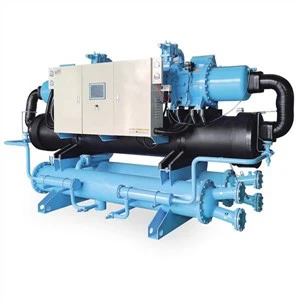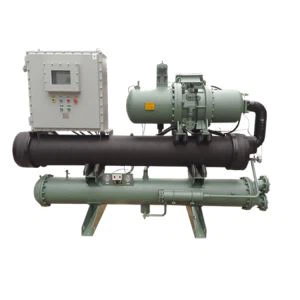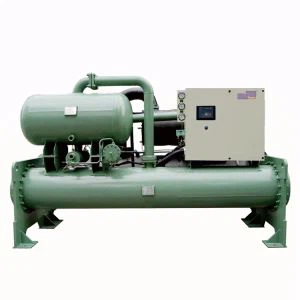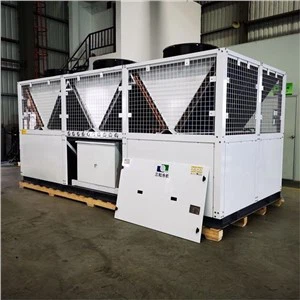As a supplier of Anti - corrosion Chillers, I've witnessed firsthand the crucial role these systems play in various industrial applications. One of the most common yet concerning issues that can plague anti - corrosion chillers is refrigerant leakage. In this blog, I'll delve into how refrigerant leakage affects an anti - corrosion chiller and why it's a matter that demands immediate attention.
Understanding the Basics of Anti - corrosion Chillers
Before we discuss the impact of refrigerant leakage, it's essential to understand what anti - corrosion chillers are. These chillers are specifically designed to withstand harsh and corrosive environments. They are often used in industries such as chemical processing, food and beverage production, and pharmaceutical manufacturing, where the presence of corrosive substances can damage standard chillers.
Our company offers a range of anti - corrosion chillers, including the Stainless Steel Air Cooled Scroll Chiller and the Anti - Corrosion Water Chiller System. These chillers are built with high - quality, corrosion - resistant materials to ensure long - term performance and reliability.


The Role of Refrigerant in an Anti - corrosion Chiller
Refrigerant is the lifeblood of any chiller system. It is responsible for absorbing heat from the process fluid (such as water or glycol) and transferring it to the outside environment. In an anti - corrosion chiller, the refrigerant undergoes a continuous cycle of evaporation and condensation.
During the evaporation process, the refrigerant absorbs heat from the process fluid, cooling it down. Then, the refrigerant is compressed, which increases its temperature and pressure. The hot, high - pressure refrigerant then releases heat to the outside environment during the condensation process. This cycle repeats itself to maintain the desired temperature of the process fluid.
Impact of Refrigerant Leakage on Cooling Performance
One of the most immediate effects of refrigerant leakage is a significant reduction in the cooling performance of the anti - corrosion chiller. When refrigerant leaks out of the system, there is less refrigerant available to absorb heat from the process fluid. As a result, the chiller struggles to maintain the set temperature, and the process fluid may not be cooled to the required level.
This can have serious consequences for industrial processes. For example, in a chemical processing plant, if the temperature of a reaction mixture is not properly controlled, it can lead to incomplete reactions, reduced product quality, and even safety hazards. In the food and beverage industry, improper cooling can cause spoilage of products, leading to financial losses.
Energy Efficiency Degradation
Refrigerant leakage also has a negative impact on the energy efficiency of the anti - corrosion chiller. When the chiller is operating with a low refrigerant charge, the compressor has to work harder to achieve the same cooling effect. This means that more energy is consumed, resulting in higher electricity bills.
In addition, the increased workload on the compressor can lead to premature wear and tear. The compressor is one of the most critical and expensive components of a chiller system. If it fails due to excessive stress caused by refrigerant leakage, it can result in costly repairs and downtime.
Compressor Damage
As mentioned earlier, the compressor has to work harder when there is a refrigerant leakage. This can cause the compressor to overheat, leading to damage to its internal components. The lubrication system of the compressor may also be affected. Refrigerant helps to lubricate the compressor's moving parts, and a low refrigerant level can result in insufficient lubrication, causing increased friction and wear.
Compressor damage not only leads to high repair costs but also disrupts the normal operation of the chiller system. In some cases, a damaged compressor may need to be replaced entirely, which can be a significant financial burden for the end - user.
Environmental Impact
Refrigerant leakage is not only a problem for the chiller system itself but also for the environment. Many refrigerants used in chiller systems are known to have a high global warming potential (GWP). When these refrigerants leak into the atmosphere, they contribute to global warming.
In recent years, there has been a growing awareness of the environmental impact of refrigerants, and many countries have implemented regulations to phase out high - GWP refrigerants. As a responsible anti - corrosion chiller supplier, we are committed to using environmentally friendly refrigerants in our products and helping our customers to comply with these regulations.
Detection and Prevention of Refrigerant Leakage
Detecting refrigerant leakage early is crucial to minimize its impact on the anti - corrosion chiller. Regular maintenance and inspection of the chiller system are essential. Trained technicians can use specialized tools, such as refrigerant leak detectors, to identify leaks.
In addition, proper installation and maintenance of the chiller system can help prevent refrigerant leakage. For example, ensuring that all connections are properly tightened and sealed during installation can reduce the risk of leaks. Regularly checking the integrity of the refrigerant piping and components can also help to catch potential leaks before they become major problems.
Conclusion
Refrigerant leakage is a serious issue that can have far - reaching consequences for an anti - corrosion chiller. It affects the cooling performance, energy efficiency, and reliability of the chiller system, and also has a negative impact on the environment. As a supplier of anti - corrosion chillers, we understand the importance of addressing refrigerant leakage promptly.
We offer comprehensive maintenance and support services to help our customers keep their chiller systems in optimal condition. If you are experiencing any issues with your anti - corrosion chiller, or if you are interested in learning more about our products, such as the Stainless Steel Air Cooled Scroll Chiller and the Anti - Corrosion Water Chiller System, please don't hesitate to contact us for procurement and further discussions.
References
- ASHRAE Handbook - Refrigeration. American Society of Heating, Refrigerating and Air - Conditioning Engineers, Inc.
- "Refrigeration and Air Conditioning Technology" by William C. Whitman, William M. Johnson, and John Tomczyk.






